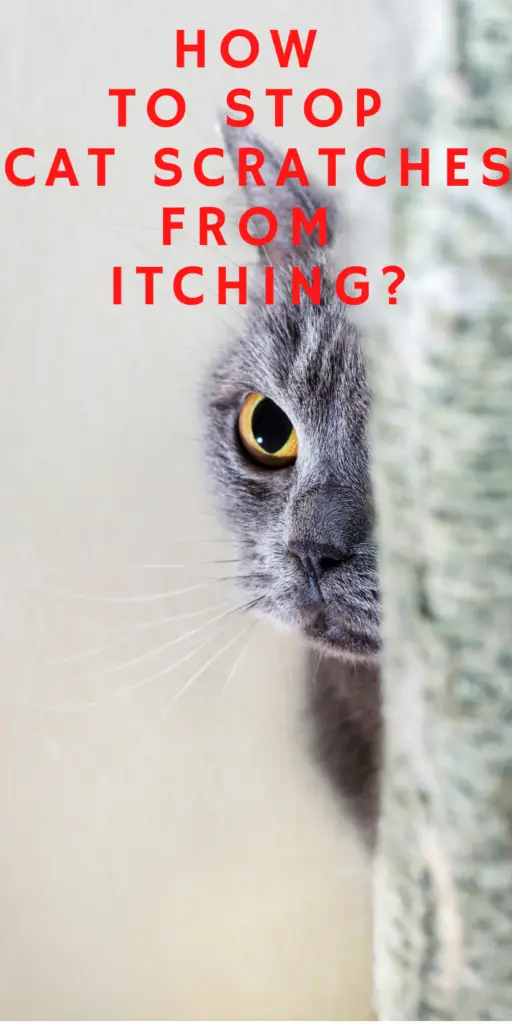HOW TO STOP CAT SCRATCHES FROM ITCHING? 5 PRACTICAL ADVICE
How to stop cat scratches from itching? To stop cat scratches from itching, you can clean the area with soap and water, apply a cold compress or anti-itch cream, take an antihistamine, and monitor for signs of infection.
Cat scratches can carry bacteria that may cause infections, so it’s important to keep the area clean and watch for signs of infection. It’s also important to take steps to avoid getting scratched by cats in the future.

HOW TO STOP CAT SCRATCHES FROM ITCHING?
If you have been scratched by a cat and the area is now itching, there are several steps you can take to relieve the itchiness:
- Clean the area: Wash the scratch with soap and water to remove any dirt or bacteria that may be contributing to the itchiness.
- Apply a cold compress: Place a clean, damp cloth or ice pack on the affected area to help reduce inflammation and numb the itch.
- Apply an anti-itch cream or ointment: Over-the-counter creams or ointments containing ingredients like hydrocortisone or calamine can help soothe the itchiness.
- Take an antihistamine: If the itchiness is severe, an oral antihistamine medication like diphenhydramine (Benadryl) can help reduce the itching and swelling.
- Monitor the scratch: Watch the scratch for signs of infection, such as redness, swelling, or pus. If the scratch appears infected, seek medical attention.
It’s important to note that cat scratches can carry bacteria that may cause infections, so keeping the area clean and watching for signs of infection is important. If you develop a fever or other symptoms, seek medical attention immediately.
Additionally, it’s important to take steps to avoid getting scratched by cats in the future, such as avoiding contact with unfamiliar cats or wearing protective clothing when handling cats.
CAT SCRATCH ITCHY BUMB – WHY IT HAPPENS?
If you have been scratched by a cat and developed itchy bumps on the affected area immediately, this may be a sign of an allergic reaction to the scratch.
Cat scratches can introduce allergens or bacteria into the skin, triggering an immune response and causing symptoms like itching, redness, and swelling.
It’s important to clean the affected area with soap and water and monitor it for signs of infection, such as increasing redness or warmth.
If the itching and bumps persist or worsen, you may want to consider seeking medical attention to determine if an allergic reaction or infection is present.
WHY DOES IT ITCH WHEN A CAT SCRATCHES YOU?
When a cat scratches you, their claws can create tiny tears or abrasions in your skin. This can introduce bacteria or other irritants into the wound, triggering an immune response in the body.
Here are the main causes for the itch on cat scratches:
1. IMMUNE RESPONSE
This immune response can cause the skin around the scratch to become inflamed, leading to itching, redness, and swelling.
2. ALLERGIC REACTIONS
In addition, cat scratches can sometimes cause an allergic reaction in some people. This allergic reaction can also cause itching, redness, and swelling and may be more severe in individuals with a history of allergies.
3. CAT SCRATCH DISEASE
Cat scratch disease (CSD), also known as cat scratch fever, is an infectious disease that is caused by a bacterium called Bartonella henselae. The bacterium is typically transmitted to humans through the bite or scratch of an infected cat, although it can also be transmitted through fleas that have bitten an infected cat.
Symptoms of cat scratch disease can include a small bump or blister at the site of the scratch or bite, swollen lymph nodes near the site of the scratch or bite, fever, fatigue, headache, and a general feeling of malaise.
In most cases, symptoms will go away on their own within a few weeks, although some people may require antibiotics if the infection is severe.
While cat scratch disease is usually mild, it can be more serious in people with weakened immune systems, such as HIV/AIDS or cancer. It can sometimes lead to complications such as eye infections, severe liver infections, or spleen.
It’s important to seek medical attention if you develop symptoms after being bitten or scratched by a cat, especially if you have a weakened immune system or if your symptoms are severe or persistent.
It’s important to clean cat scratches with soap and water as soon as possible to reduce the risk of infection and to watch for signs of infection, such as increasing redness, warmth, or pain.
If the itching or other symptoms persist or worsen, you may want to seek medical attention to determine if an allergic reaction or infection is present.
IS A CAT NAIL SCRATCH DANGEROUS?

Cat nail scratches can potentially be dangerous, as they can introduce bacteria and other microorganisms into the wound.
If the wound is not properly cleaned and disinfected, it can become infected, leading to symptoms such as redness, swelling, pain, and warmth around the wound. In severe cases, the infection can spread to other parts of the body and cause more serious health problems.
It’s important to clean cat nail scratches as soon as possible with soap and water or an antiseptic solution and to monitor the wound for any signs of infection.
If the wound shows signs of infection or develops symptoms like fever, chills, or fatigue, you should immediately seek medical attention. In addition, if you have any underlying medical conditions or a weakened immune system, you may be at a higher risk of complications from a cat scratch and should seek medical attention promptly.
WHAT ARE THE ALLERGIC REACTION TO A CAT SCRATCH?
An allergic reaction to a cat scratch can cause a variety of symptoms, including:
- Itching or swelling at the site of the scratch
- Redness or rash on the skin
- Hives or welts on the skin
- Difficulty breathing or shortness of breath
- Swelling of the face, lips, tongue, or throat
- Wheezing or coughing
- Nausea or vomiting
- Dizziness or lightheadedness
If you experience any of these symptoms after being scratched by a cat, you should seek medical attention immediately. An allergic reaction can be potentially life-threatening; prompt treatment is necessary to prevent complications.
In addition, if you have a known allergy to cats, you should take precautions to avoid contact with them to prevent future allergic reactions.
WHAT ANTIBIOTIC OINTMENT FOR CAT SCRATCHES CAN I USE?
Several antibiotic ointments can be used for a cat scratch, including:
- Neosporin
- Bacitracin
- Polysporin
- Triple Antibiotic Ointment


![MED PRIDE Triple Antibiotic Ointment [1 oz] 4-Pack |...](https://m.media-amazon.com/images/I/51NcDFk4dlL._SL160_.jpg)




![MED PRIDE Triple Antibiotic Ointment [1 oz] 4-Pack |...](https://m.media-amazon.com/images/I/51NcDFk4dlL._SL160_.jpg)


It’s important to clean the scratch thoroughly with soap and water before applying any ointment. Then, apply some antibiotic ointment to the scratch and cover it with a sterile bandage or dressing. Be sure to follow the instructions on the product label and use the ointment as directed.
If the scratch becomes infected or if you experience symptoms such as redness, swelling, or warmth around the wound, you should seek medical attention. Your healthcare provider may prescribe a stronger antibiotic or recommend other treatments to help prevent complications.
HOW LONG DOES IT TAKE FOR A CAT SCRATCH TO HEAL FULLY?
The healing time for a cat scratch can vary depending on the severity of the scratch and how well it is taken care of.
Generally, a minor scratch that does not become infected can take anywhere from a few days to a week or two to heal completely. However, deeper or more severe scratches may take longer to heal, especially if they become infected.
To help speed up the healing process, it’s important to keep the scratch clean and dry, and to avoid scratching or picking at the scab. You can also apply a topical antibiotic ointment to the scratch to help prevent infection and promote healing.
CAN I PUT COCONUT OIL ON THE CAT SCRATCH?
While coconut oil has some beneficial properties, using it on a cat scratch is generally not recommended. Coconut oil is not an antiseptic, and it may not be effective in preventing or treating an infection that could develop from a cat scratch.
Instead of coconut oil, it’s recommended to clean the cat scratch with soap and water and then apply an antibiotic ointment if necessary. This can help prevent infection and promote healing.
WHAT HOME REMEDY CAN I USE FOR CAT SCRATCHES?
While it’s important to seek medical attention if a cat scratch becomes infected or if you experience severe symptoms, some home remedies may help alleviate minor symptoms associated with a cat scratch. Here are a few home remedies you can try:
- Clean the scratch thoroughly with soap and water to remove any dirt or debris that may be in the wound.
- Apply a cold compress or ice pack to the affected area to help reduce swelling and inflammation.
- Apply a small amount of aloe vera gel or honey to the scratch to help soothe the skin and promote healing.
- Take an over-the-counter pain reliever, such as ibuprofen or acetaminophen, to help relieve any pain or discomfort.
- Apply a topical anti-itch cream, such as hydrocortisone cream, to help alleviate itching or irritation.
It’s important to note that these home remedies are not a substitute for medical treatment. If you experience any signs of infection or if your symptoms persist or worsen, you should immediately seek medical attention.
LEGGI ANCHE: WHY ARE STRAY CATS SO FRIENDLY? 3 INTERESTING FACTS







